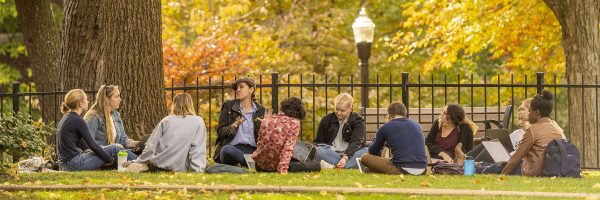A collaboration between the Stanton Foundation and Vanderbilt University will launch the Open Dialogue Visiting Fellows program on campus this fall—a new series to equip students for engaged and informed citizenship in a fractured world.
Through the program, Vanderbilt will host a cohort of thought leaders with competing and sometimes conflicting views on policy issues and social problems. These visitors will engage with students, faculty, the public and each other to model reasoned, evidence-based civil debate.
The fellows are part of Vanderbilt’s new Dialogue Vanderbilt, an initiative that provides a range of programs to students, faculty and the public that promote civil discourse and help them better understand and address political polarization.
“This program is an important example of Vanderbilt’s core commitment to free expression and the open, yet respectful, discourse that is essential to everything we do as a university,” Chancellor Daniel Diermeier said. “It illustrates our conviction that all members of a university community need not agree, but should listen to opposing views and learn from each other. By engaging with the public as well our students and faculty, the program furthers our aim of restoring norms of civil discourse not only on our campus, but in broader society as well.”

This academic year, the Open Dialogue Visiting Fellows program speakers will address the question: “What is College For?” The topic is timely as higher education navigates hot-button issues, including free speech on campus, race and legacy factors in admissions and the perceived “value” and cost of a college degree. For the fall semester, visitors will focus on the notion safety on campus with talks under the theme of “Safe Spaces, Dangerous Words: How Safe Should College Be?”
The visiting fellows program will be shaped by a cohort of Open Dialogue student ambassadors. Ambassadors will design programs for their peers, host visiting speakers and serve as representatives of the program to the Vanderbilt community.
They will be working closely with faculty and campus visitors, said Sarah Igo, one of the program’s planners, the Andrew Jackson Professor of History and the dean of strategic initiatives for the College of Arts and Sciences.
“Students will develop new insight into complex issues. They will also gain appreciation for the disagreement, discord and compromise that are vital parts of civic life in a democracy,” she added.
The first public event sponsored by the Open Dialogue Visiting Fellows program will be on Sept. 18 at 4 p.m. in Alumni Hall (Memorial Room), where author Sigal R. Ben-Porath will discuss her book Cancel Wars: How Universities Can Foster Free Speech, Promote Inclusion, and Renew Democracy. The event is free and open to the Vanderbilt community, and it will be followed by a book signing and reception. While on campus, Ben-Porath will also meet with administrators, faculty and students to discuss the challenges facing the ideal of open dialogue in higher education today.
Other fellows visiting campus this fall include Jennifer Carlson, a sociologist who studies guns in America, and Maria Hinojosa, a journalist for NPR known for her reporting on youth violence and civil rights. Scholar Jonathan Rauch, author of The Constitution of Knowledge: A Defense of Truth, will discuss affirmative action in January. See the full list of events at https://www.vanderbilt.edu/open-dialogue-fellows/events/.
The Stanton Foundation, a New York-based nonprofit with a mission to protect First Amendment rights and create a more informed citizenry, provided a $500,000 grant to launch the Open Dialogue Visiting Fellows program.
The Open Dialogue Visiting Fellows program is directed by John Geer, a senior advisor to the chancellor on key strategic initiatives that promote democracy, free expression and open dialogue; Sarah Igo, holder of the Andrew Jackson Chair of American History, dean of strategic initiatives for the College of Arts and Sciences, and professor of history, political science and law; and Jonathan Metzl, holder of the Frederick B. Rentschler II Chair, professor of sociology, of history, of medicine, health and society, and of psychiatry and behavioral sciences, and director of the Department of Medicine, Health and Society.
Learn more about Vanderbilt’s commitment to free expression.
Learn more about Dialogue Vanderbilt.